Letters: Despite some success, racial inequity still exists in Jacksonville and the U.S.
- Oops!Something went wrong.Please try again later.
On the first Thursday of each month, the Jacksonville Urban League hosts a speaker on racial healing, reconciliation and equity. In October, it was Dr. David Livingstone Smith, professor at the University of New England and author of several books on racism. He spoke of how huge crowds of people often gathered to witness the hanging and slow burning to death of Black men.
His talk remined me that after slavery was outlawed, the Southern states passed laws making it easy to put Black people in jail for things like walking in the wrong place. These prisoners had to work seven days a week for 16 hours a day.
President Franklin D. Roosevelt enacted the first laws to prohibit employment discrimination against Blacks in 1942. Yet slavery still existed in much of the South throughout the 1950s and early 1960s in the form of Jim Crow laws.
Racism continues to create inequities in access to housing, education, employment and wealth. As a city, Jacksonville continues to forget what happened in 1968.
That’s when Black people were told they would receive “lower taxes, increased economic development, unification of the community, better public spending and effective administration by a more central authority” to encourage a vote for extending city boundaries. The city never acted on it.
A good way to get some insight into what life is like for a Black person is to read former Jacksonville Sheriff Nat Glover’s book, “Striving for Justice: A Black Sheriff in the Deep South.” Glover was blessed with good parents and good advice from both Black and white people on life choices. What he accomplished, given the obstacles in his way, is amazing.
A racist should know that human biological variation is only 0.1%. The variation is in skin color, hair, facial features, etc. ― not intellect.
The economic cost of our continued suppression of Black people is enormous. I believe expenditures for police, jails and crime prosecution would largely disappear if they were given equity in all areas. We know they would do as well as anyone else and would contribute much more to the economy.
Attempts to suppress this information will harm our country.
William Malone, Jacksonville
Book bans are censorship
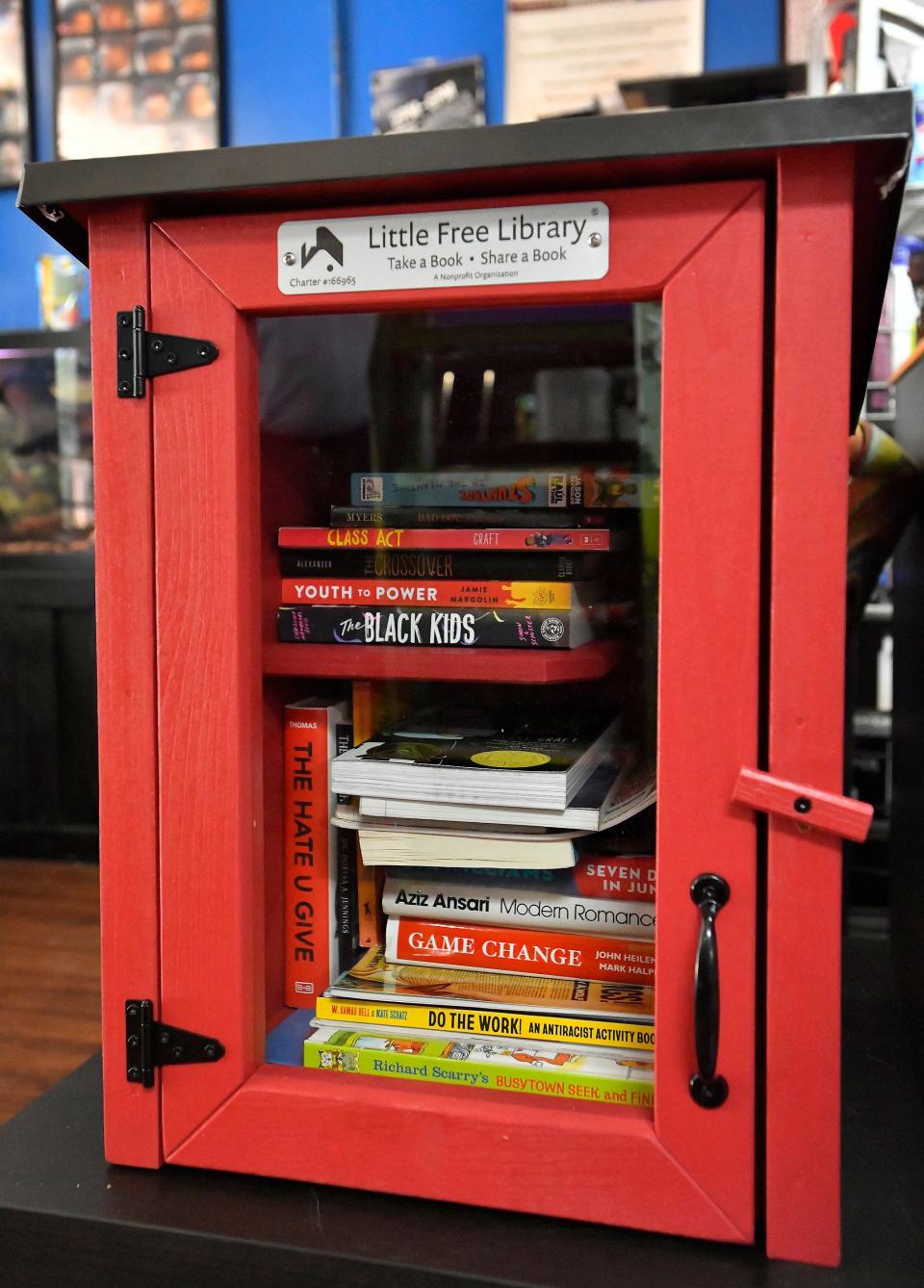
Book banning, initially started by religious leaders, has been practiced since the 1600s. Recently, the number of books banned from schools and libraries has been rapidly increasing throughout the United States. Florida is leading that charge with over 1,400 banned books.
Some well-known books temporarily pulled from school shelves for review or permanently banned in various Florida school districts include: The Holy Bible, “I is for Immigrants,” “A Storm Called Katrina,” “To Kill a Mockingbird,” “The Fault in Our Stars,” “The Handmaid's Tale,” “The Perks of Being a Wallflower,” “The Hate U Give” and more.
Book banning is a form of censorship of knowledge and ideas. It is also a violation of a child's right to access knowledge that could be critically important to their well-being — for both children and adults. It removes the freedom to “seek, receive and impart information and ideas of all kinds, regardless of frontiers, either orally, in writing or in print, in the form of art, or through any other media" of the child's choice.
Reading can enhance creativity, impart good values, help language development and improve communication skills. Those are just a few reasons why reading is important in learning and education. One of the primary goals and functions in educating children is teaching them to think for themselves. The large majority of books that have been restricted have been children’s books.
In Florida, book bans are created and enforced at a school district level. Not every book is meant for every reader, but each reader should have the freedom and the right to be a part of determining whether a book is meant for them to read or not. It is time for the majority of our community who are against banning books to be heard.
Children must have the right to freedom of thought and conscience. With banning books and censorship of knowledge and ideas, what does that mean for the future of our community? What does that mean for children, adolescents and adults who want to broaden their understanding of the world around them by reading all kinds of books?
Tiffany Le, M.D., Jacksonville
Jags, city must both ‘be better’
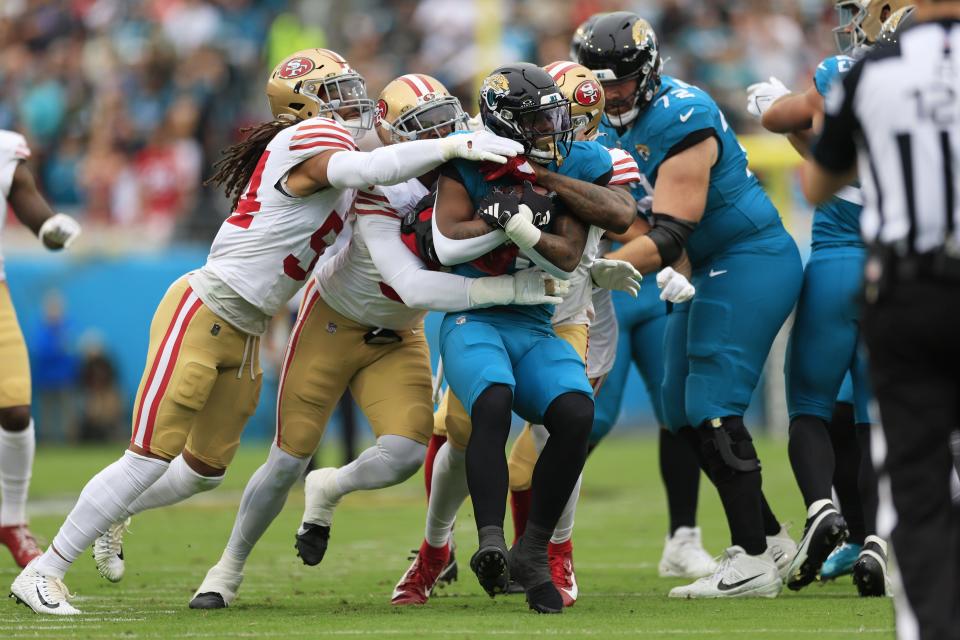
The post-game responses from the Jacksonville Jaguars after the Nov. 12 game against the San Francisco 49ers can be a wake-up call for Jacksonville’s own aspirations to become a truly great city.
The latest team mantra is “We’ve got to be better.” The power of admitting embarrassment and shame can be a turning point on the road to success. Acknowledging the futility in a five-possession stretch of going fumble, field goal, interception, fumble and interception should calm the boasting with some much-needed humility.
Now that the Jaguars have been knocked down a peg, they might be able to rise and conquer the challenges ahead. All they must do is “become the best version of themselves every week” and “remember that humility is just a week away,” as Coach Kirby Smart drills into his Georgia Bulldogs football team every day.
How does this relate to Jacksonville’s aspirations? The city (and the Downtown Investment Authority) should be embarrassed that their most recent “locker room rah-rah” has not quelled the doubters who are rightfully frustrated with the lack of development progress. Not to mention the almost nonexistent manifestations of their eager incentive packages.
Jacksonville can’t endure another punt or turnover in its quest to deliver major improvements, with the Laura Street Trio, Riverfront Plaza and Friendship Fountain as just three examples.
The city would do itself and its citizens a tremendous service if they simply woke every morning saying, “We’ve got to be better.” The tagline “Bold New City of the South” morphed into “It’s Easier Here” and neither message resonated with investors. Even Mr. Khan has denigrated downtown and its lack of moxie.
Jacksonville should shift from exercising hubris to rigorously being better in every endeavor. Otherwise, someone will find a weakness, take advantage of it and leave them sitting on the sidelines.
Just like the Jaguars, the city is now in a good position with a great “coach.” Let’s hope that with some humility, honesty, grit and determination they both achieve their goals.
Rick Pariani, Avondale
Monumental conundrum

It’s hard to imagine a more divisive time in American history than the Civil War. We know this without personally witnessing those bloody years and the grievous tragedies that occurred. Yet, a sad percentage of our population still lives with inaccurate, romanticized narratives about that conflict that forever shaped our nation. False narratives make us a weaker and more divided nation.
Confederate monuments pose a real conundrum. They remind us of human rights atrocities, but this reminder is essential. My position is guided by two truths: our historic monuments are testament to our history, and their removal eradicates evidence of the mistakes we’ve made.
So how do we convert excruciatingly painful images into essential lessons? By breathing truth into them.
It is not the monuments themselves that evoke our strong emotional responses, it is the words on the placards that represent either populist whitewashing or factual truths. History has subjective sides ― but only one truth that must never be altered. This truth is not always comfortable, but it is instructive. Truth uniquely allows for both reflection back and guidance forward.
Leave the monuments where they stand and replace their bronze inscriptions with truth, so they may remind us of what we have overcome, inspire us to become a better people or bring us to tears over grave mistakes that cannot be repeated. The most courageous thing we can do is to be accountable as a nation and remain resolute to learn from our errors.
The easiest, most foolish and dangerous act of cowardice would be to deny the past by removing reminders of our fallible human condition.
Our accomplishments as a nation have guided the world, but the cost of our mistakes weighs heavily on our history. Don’t waste more time and resources by dismantling and removing these controversial monuments; we need only recast their truth in bronze for the world to see ― and remember.
Michael Crocetta, Jacksonville
Homeless Jags?
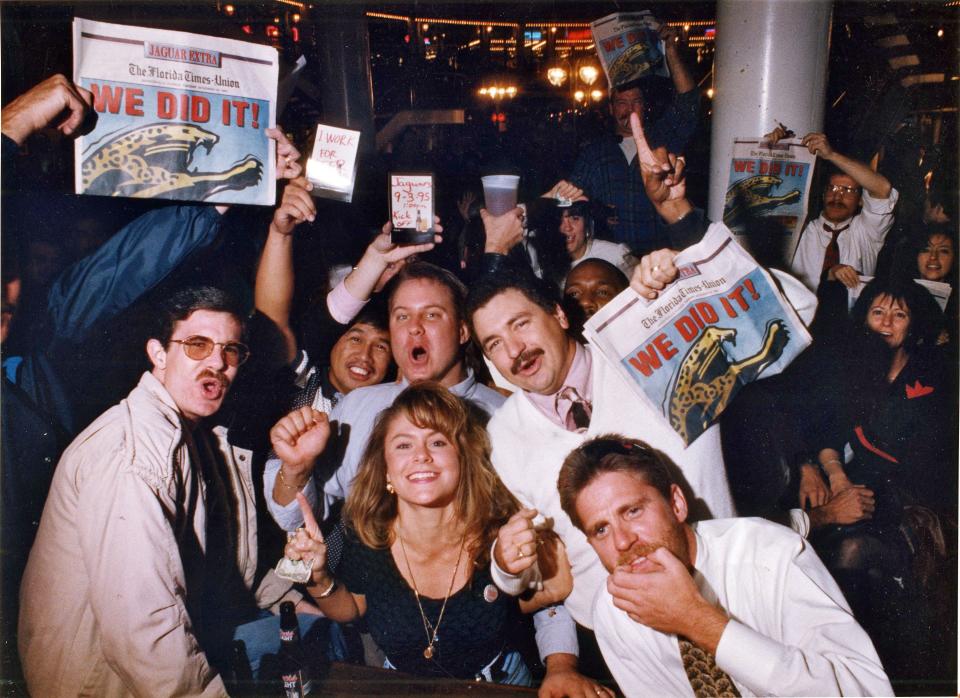
Born in 1993 and having played their first game in 1995, the Jacksonville Jaguars have a 30-year anniversary coming up. One would think that we’d have a solid, loyal fanbase and traditions after three decades.
But apparently, we do not. The Nov. 12 game against the San Franciso 49ers was a sea of red in the stadium, full of fans from the opposing team. So much for home-field advantage.
The issue must be that local fans were selling their tickets. Oh sure, they can do as they wish. But in my view, it’s an extra dollar taking precedence over loyalty to your home team.
When the Jags run out of the tunnel to see the stadium full of loud, cheering fans ― for the other team ― that’s motivating, I’m sure.
To ever think this city and its fan base would have the rabid following of teams like the Philadelphia Eagles, New England Patriots, Green Bay Packers, Buffalo Bills, etc., is delusional. Selling tickets to opposing fans is sacrilegious. Yes, those are older, more established teams; but after 30 years, are they still a “young” franchise?
It's confusing; the team is finally good and has potential this season. Yet fans don’t really seem to care. For years we’ve heard this is a college town and the NFL is second, by far.
This fan agrees and was seeing red (in more ways than one) last Sunday. Our team is homeless. With apologies to the real fans; I know you share the pain … and embarrassment.
Gary Schuran, Middleburg
Glass houses, Mr. Howland
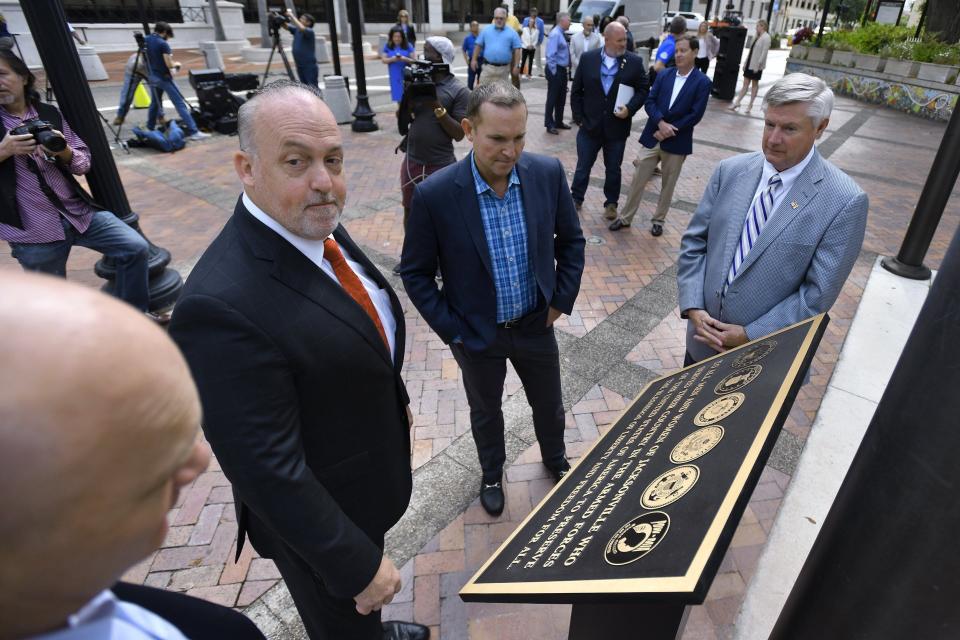
There is an old saying: Those who live in glass houses should not throw stones.
But here City Councilman Nick Howland is criticizing Mayor Donna Deegan for awarding a no-bid contract to Langton Consulting to provide grant writing, federal lobbying and public policy formulation services for Jacksonville. However, Howland has been behind a noncompetitive grant process that benefits a veterans’ advocacy nonprofit that he has run for several years now.
The Langton contract is going to be a one-year contract that did not undergo competitive bidding this year because Jacksonville needed a company that could provide those three services immediately. But Howland's nonprofit has gotten noncompetitive grants every year he has been in office.
The Langton contract was also awarded after a search found that it was the only company that was able to offer the three services listed above. Howland said that when he searched online for a used car, he also made telephone calls.
Of course, anyone on the telephone might tell you that they can provide another service. But in my mind, only a company that is serious about all its services will invest the time and money to market all of them online.
Howland should keep that old saying in mind.
Terry D. Bork, Jacksonville
It can happen here
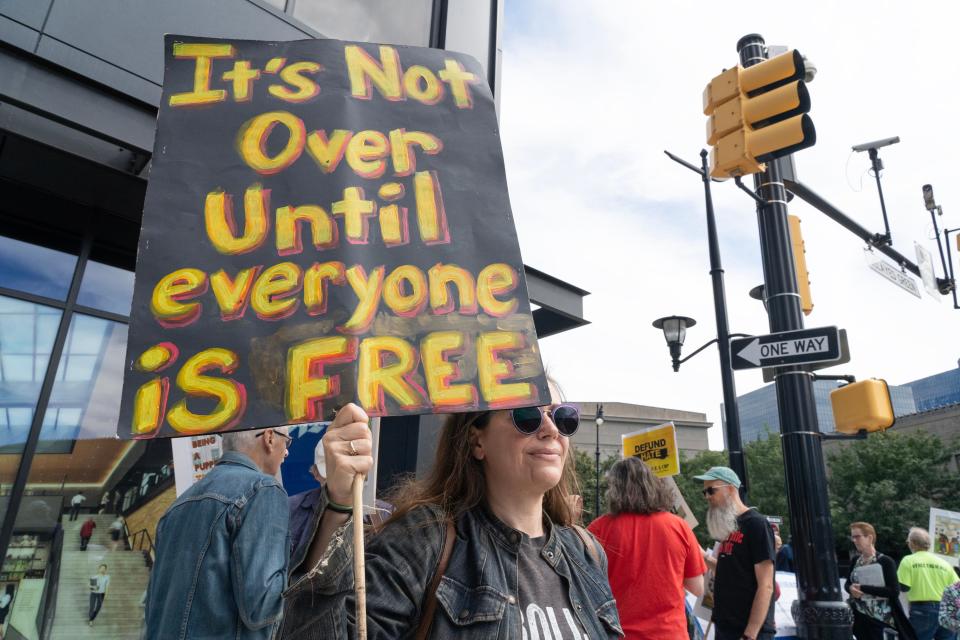
Detention camps for immigrants; stifling of a free press; using the Justice Department for retribution, etc. All the foregoing has millions of concerned Americans frightened, and with good reason.
The book, “It Can’t Happen Here” by Sinclair Lewis (a Nobel Prize winner for literature) was published in 1935. It was ― and remains ― eerily prescient as to what is happening now in our fractured and highly political society. The characters in the book can be likened to those currently running for office.
I’m reminded of this whenever I read almost any news story about our candidates, especially Trump and DeSantis, and the increasingly negative campaign ads by almost all candidates, regardless of party. Lewis’s book addresses nationalism both here and throughout the world, the suppression of basic freedoms and the consequences of such actions.
It is a must-read for anyone concerned about this country.
John G. Barry, III, Jacksonville
This article originally appeared on Florida Times-Union: Still many obstacles for people of color in Jacksonville and the south

